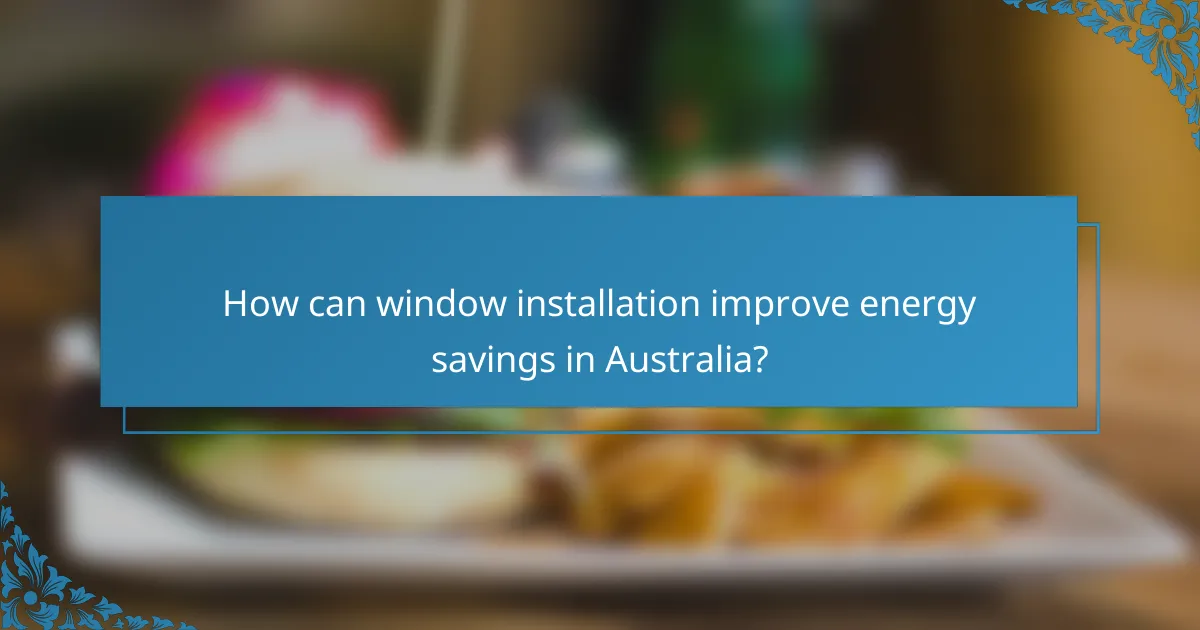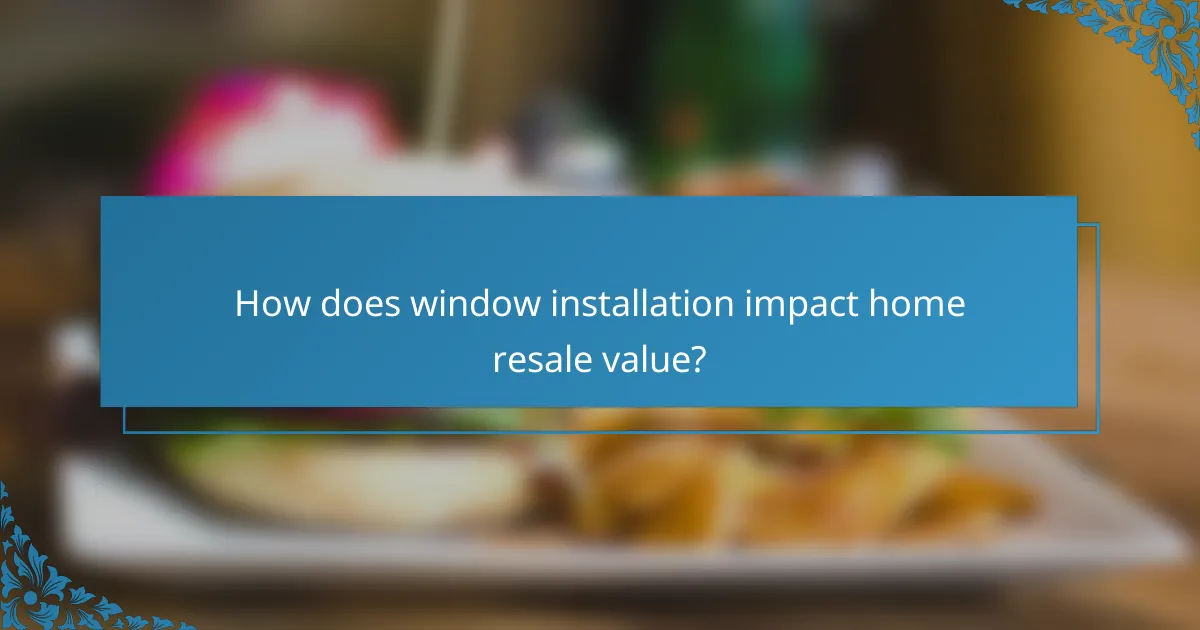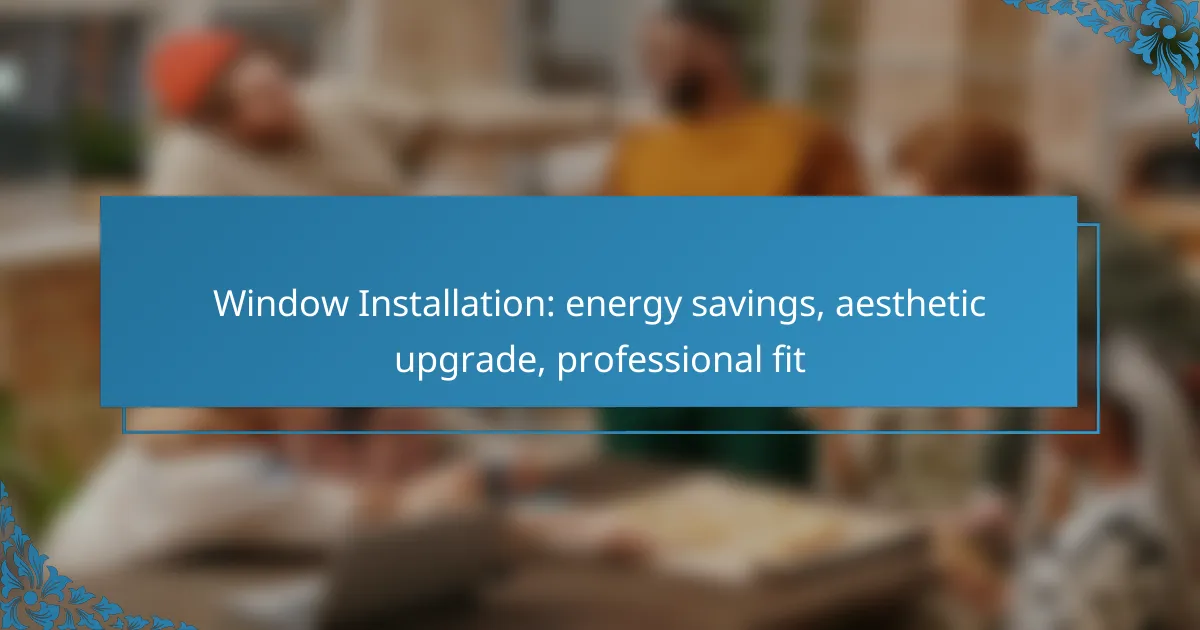Installing new windows can lead to substantial energy savings by minimizing heat loss and enhancing insulation, ultimately lowering energy bills. Additionally, new windows provide an aesthetic upgrade, transforming both the interior and exterior of your home while boosting its visual appeal. To achieve the best results, professional installation is essential, ensuring a perfect fit that maximizes energy efficiency and enhances your home’s overall look.

How can window installation improve energy savings in Australia?
Window installation can significantly enhance energy savings in Australia by reducing heat loss and improving insulation. By choosing the right windows, homeowners can lower their energy bills and create a more comfortable living environment.
Energy-efficient window types
Energy-efficient windows are designed to minimize heat transfer, which is crucial in Australia’s diverse climate. Common types include double-glazed windows, which feature two panes of glass with a gas-filled space in between, and low-emissivity (Low-E) glass that reflects heat back into the room.
When selecting windows, look for those with a high energy rating, typically indicated by the Window Energy Rating Scheme (WERS) in Australia. This rating helps identify windows that will perform well in terms of insulation and energy efficiency.
Insulation benefits
Properly installed windows enhance insulation, reducing the need for heating in winter and cooling in summer. This is especially important in regions with extreme temperatures, as effective insulation can lead to a more stable indoor climate.
Consider using window frames made from materials like uPVC or wood, which offer better insulation compared to aluminum. Additionally, ensure that windows are sealed correctly to prevent air leaks that can undermine energy savings.
Long-term cost savings
Investing in energy-efficient windows can lead to substantial long-term cost savings on energy bills. While the initial installation may require a higher upfront investment, the reduction in heating and cooling costs can pay off within a few years.
Homeowners can expect to save anywhere from 10% to 30% on their energy bills, depending on the type of windows installed and local climate conditions. Additionally, energy-efficient windows can increase property value, making them a wise investment for the future.

What aesthetic upgrades do new windows provide?
New windows offer significant aesthetic upgrades by enhancing the overall appearance of a home while improving energy efficiency. They can transform the look of both the interior and exterior, making properties more visually appealing and modern.
Modern design options
Modern windows come in various styles, including casement, double-hung, and sliding designs that can complement any architectural style. Homeowners can choose from a range of materials such as vinyl, wood, or fiberglass, each offering unique visual characteristics and benefits.
Additionally, energy-efficient features like low-E glass and multi-pane designs not only enhance aesthetics but also improve thermal performance. Selecting the right design can elevate the curb appeal and create a cohesive look throughout the property.
Impact on property value
Upgrading to new windows can significantly increase a property’s market value. Homes with modern, energy-efficient windows are often more attractive to buyers, leading to quicker sales and potentially higher offers.
Investing in quality window installations can yield returns of around 70-80% of the initial cost, depending on the local real estate market. This makes window upgrades a smart choice for homeowners looking to enhance both aesthetics and resale value.
Customization possibilities
Homeowners can customize new windows to fit their specific style preferences and functional needs. Options include various frame colors, grid patterns, and hardware finishes that allow for a personalized touch.
Furthermore, custom sizes and shapes can be designed to fit unique architectural features, ensuring that new windows not only look great but also function effectively within the existing structure. This level of customization can significantly enhance the overall aesthetic appeal of a home.

Why is professional window installation important?
Professional window installation is crucial for ensuring optimal performance, energy efficiency, and aesthetic appeal. A skilled installer guarantees that windows are fitted correctly, which minimizes air leaks and enhances the overall look of your home.
Proper sealing techniques
Proper sealing techniques are essential for preventing drafts and moisture intrusion. Professionals use high-quality caulking and weatherstripping to create airtight seals around windows, which can significantly improve energy efficiency. This attention to detail helps maintain a comfortable indoor temperature and reduces heating and cooling costs.
When selecting a contractor, inquire about their sealing methods. Look for installers who use foam insulation or specialized sealants that conform to the window frame, as these materials provide better insulation compared to standard options.
Compliance with building codes
Compliance with building codes ensures that window installations meet safety and performance standards. Professional installers are familiar with local regulations, which can vary by region, and they ensure that all work is done according to these guidelines. This compliance not only protects your investment but also enhances the safety of your home.
Before installation, verify that your contractor is licensed and knowledgeable about the relevant codes in your area. This can prevent costly fines and the need for rework if the installation does not meet local requirements.
Warranty and service guarantees
Warranties and service guarantees provide peace of mind that your investment is protected. Professional window installers typically offer warranties on both the windows and their workmanship, ensuring that any issues arising from installation defects are addressed without additional costs.
When choosing a contractor, ask about the specifics of their warranty coverage. Look for warranties that last several years and cover both materials and labor, as this indicates confidence in the quality of their work and the products used.

What are the key factors to consider when choosing windows?
When selecting windows, consider material types, energy ratings, and local climate conditions. These factors significantly influence energy efficiency, aesthetics, and overall performance.
Material types
Window materials include wood, vinyl, aluminum, and fiberglass, each offering distinct advantages. Wood provides excellent insulation and aesthetic appeal but requires maintenance. Vinyl is low-maintenance and energy-efficient, while aluminum is durable but less insulating. Fiberglass combines strength with energy efficiency, making it a popular choice.
Consider your budget and the maintenance level you are willing to commit to when choosing a material. For example, wood windows may have a higher upfront cost but can enhance the home’s value.
Energy ratings
Energy ratings, such as the Energy Star label, indicate a window’s efficiency in preventing heat loss and gain. Look for windows with low U-factors and high Solar Heat Gain Coefficient (SHGC) ratings to maximize energy savings. A U-factor below 0.30 is generally considered good for energy efficiency.
Choosing windows with appropriate energy ratings can lead to significant savings on heating and cooling costs over time, often recouping the initial investment within a few years.
Local climate considerations
Your local climate plays a crucial role in window selection. In colder regions, opt for windows with better insulation properties, while warmer climates may benefit from windows that reduce solar heat gain. For example, double-glazed windows are ideal for colder areas, while low-E coatings can help in hotter climates.
Additionally, consider local building codes and regulations that may dictate specific window requirements for energy efficiency or safety. Understanding these factors can help ensure compliance and enhance your home’s performance.

How does window installation impact home resale value?
Window installation can significantly enhance a home’s resale value by improving energy efficiency and aesthetic appeal. Buyers often seek homes with modern, well-fitted windows that promise lower energy costs and a more attractive exterior.
Market trends in Australia
In Australia, the demand for energy-efficient homes is on the rise, with many buyers prioritizing sustainability. Double-glazed windows and energy-efficient installations are increasingly seen as essential features, reflecting a broader trend towards eco-friendly living.
Recent data indicates that homes with upgraded windows can command higher prices in competitive markets, particularly in urban areas where energy costs are a concern. This trend suggests that investing in quality window installations can yield favorable outcomes when selling a property.
Buyer preferences
Buyers today are more discerning about the features of their potential homes, with a strong preference for energy-efficient solutions. Many are willing to pay a premium for homes that include modern window installations, as these contribute to lower utility bills and enhanced comfort.
Aesthetic considerations also play a crucial role; homes with stylish, well-installed windows are more appealing. Features such as frame materials, colors, and styles can influence buyer interest and perceived value.
Return on investment
The return on investment (ROI) for window installation can vary, but homeowners can generally expect a significant percentage of their costs to be recouped upon resale. Estimates suggest that homeowners might recover around 70-80% of their investment, depending on the quality of the windows and the local market conditions.
To maximize ROI, it’s advisable to choose energy-efficient windows that comply with local building regulations and standards. Additionally, focusing on popular styles and materials can further enhance the appeal and value of the home during resale.

What permits are required for window installation in Australia?
In Australia, window installation typically requires a building permit, which ensures compliance with local building codes and regulations. The specific requirements can vary by state and municipality, so it’s essential to check with local authorities before proceeding.
Building Permits
Building permits are essential for window installation as they confirm that the project meets safety and structural standards. Depending on the scope of the installation, you may need to submit plans and specifications for approval. It’s advisable to consult with a licensed builder or architect to ensure all necessary documentation is prepared.
Development Approvals
In some cases, especially for major renovations or installations in heritage-listed buildings, you may need a development approval. This process assesses the impact of the installation on the surrounding environment and community. Local councils often have specific guidelines regarding the aesthetic and historical considerations for such projects.
Compliance with Australian Standards
Window installations must comply with Australian Standards, such as AS 2047 for windows in buildings. These standards ensure that windows are energy-efficient, safe, and suitable for the local climate. Familiarizing yourself with these standards can help avoid costly modifications later on.
Local Regulations
Each state and territory in Australia has its own regulations regarding window installations. For example, some areas may have restrictions on the types of materials used or the design of windows in certain zones. Always check with your local council to understand the specific regulations that apply to your project.
